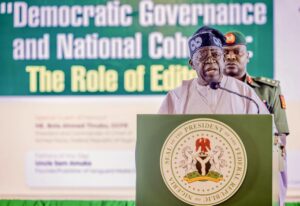By
Ola Olateju
President Bola Ahmed Tinubu’s sudden directive ordering the withdrawal of police personnel attached to Very Important Persons (VIPs) across the country has stirred intense debate about motive, timing, and the broader security implications for a nation already overwhelmed by insecurity. While the presidency insists the move is driven by acute manpower shortages needed to confront rising crime, critics argue that the policy raises more questions than answers.

A Policy That Creates a Vacuum Before Filling One
According to the directive, VIPs who wish to retain escorts must now apply for personnel from the Nigeria Security and Civil Defence Corps (NSCDC). In principle, shifting VIP protection from police officers to NSCDC operatives could free up thousands of police personnel for national security operations. However, the execution appears contradictory.
Rather than an automatic transfer or immediate replacement, VIPs are required to make fresh applications – essentially creating a gap between withdrawal and replacement. Yet, conspicuously, the President’s own son reportedly continues to enjoy full police escort, raising accusations of selective application of the policy.
For critics, this undermines the credibility of the reform. If the objective is manpower optimisation, consistency should be the first sign of sincerity.
The Sudden Recruitment of 30,000 Officers: A Security Reform or a Political Strategy?
The President also announced the accelerated recruitment of 30,000 Nigerians into the Police Force. Ordinarily, this should be welcome news in a country with one of the lowest police-to-population ratios in the world. But, the timing, scale, and political atmosphere have fueled suspicion.
With the 2027 election cycle already casting a long shadow, some observers fear the recruitment may serve a dual purpose – strengthening security on paper while quietly expanding the political machinery of the ruling All Progressives Congress (APC). The fear, especially among VIPs perceived to be reluctant toward the President’s re-election bid, is that the withdrawal of police escorts exposes them to targeted insecurity in the pre-election season.
No evidence has been provided to confirm such political motivations, but in a country where security institutions have often been politicised, these concerns cannot simply be waved aside.
The Real Issues the Police Have Repeatedly Raised
Beyond political intrigue, the directive fails to address the longstanding and well-documented structural challenges that have crippled the Police Force for decades. Officers have consistently complained about:
Poor remuneration
An unfavorable pension scheme
Dilapidated barracks and operational facilities
Outdated equipment and inadequate logistics
Insufficient training and psychological support
These are the real reasons morale is low, not merely an insufficient headcount. Without addressing these root problems, recruitment and redeployment may achieve little more than a cosmetic reshuffling.
A nation cannot police its way out of insecurity with a demoralised force.
A Misdiagnosis of Nigeria’s Security Crisis
Another contradiction sits at the heart of the new directive. The government insists that personnel are needed to combat rising insecurity. Yet, in reality, many of the most violent crimes ranging from terrorism to large-scale banditry, highway abductions, and rural insurgency are being handled by the Nigerian Armed Forces, not the police. Over the years, the civil policing function has increasingly been outsourced to the military out of necessity, not strategy.
If the root of insecurity is the proliferation of armed groups with military-grade weapons, why is the solution to reassign VIP police escorts instead of strengthening joint intelligence, border control, police equipment, or community-based policing? Critics argue that this is “wrong medication for a festering ailment.”
A security sector reform that ignores the broader ecosystem like military overstretch, weak intelligence coordination, porous borders, and the socioeconomic engines of crime risks achieving little.
The Need for Transparency and a Coherent Reform Blueprint
Nigeria urgently needs security reforms, but they must come with clarity, consistency, and transparency. The withdrawal of VIP police escorts may have been intended to be a bold step toward efficiency, but its implementation has opened the door to suspicion and political interpretation.
If the goal is genuine reform, then the government must:
1. Ensure equal enforcement of police withdrawal directives
2. Clarify the criteria, timeline, and process for NSCDC replacement
3. Guarantee transparent, merit-based police recruitment and not political patronage
4. Address welfare and facility deficits at the core of police weakness
5. Reevaluate Nigeria’s over-militarisation of internal security
Nigeria’s security architecture is fragile. Policies that appear selective, sudden, or politically motivated risk worsening an already volatile atmosphere.
Conclusion
President Tinubu’s decision may ultimately be well-intentioned or strategically necessary. But in the absence of transparency, careful planning, and structural reform, it risks being seen as politically calculated rather than security-driven.
At a time when kidnapping, terrorism, and banditry continue to ravage communities, Nigeria needs coherent security solutions, not fragmented and opaque directives that deepen mistrust. Real reform begins not with who loses police escorts but with how the police themselves are treated, equipped, trained, and insulated from politics.

